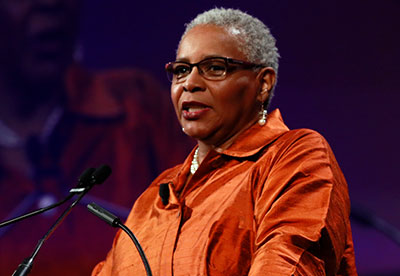Stewart Brings a Robust and Eventful Presidential Year to a Close

Recounting a remarkably eventful presidential year, APA President Altha Stewart, M.D., said the Association renewed its global reach while laying the groundwork for a more diverse and inclusive profession and responding to several national emergencies.
In her address at the Opening Session, she marked the historic nature of the meeting—the 175th anniversary of APA—saying that the Association had traveled far since 1844 but was still pursuing the founders’ original vision.
“The resources have changed,” she said. “Today we’ve got modern technology. Even the most seriously mentally ill person generally navigates a phone well enough to get reminders about medication or appointments. But when you think about it, we’re using the resources we have today to provide humane treatment the way we did 175 years ago. It’s different, but it’s good to know we’re back to our original mission—to get the appropriate and best possible care to people at the time that they need it.”
At least some of APA’s most important work this year was compelled by events in the news. “Early in the year, we, and many other Americans, were stunned at the news of what was happening at our Southern border where children and families were being separated,” Stewart said. “It was an APA member, Dr. Pamela McPherson, that first made us all aware that this policy was in place and spoke out against it… . APA was one of the first medical organizations to condemn the policy, made it part of our advocacy work, and became actively engaged in helping our colleagues who were working on the border.”
She also highlighted APA’s new collaboration with AFFIRM, the American Foundation for Firearm Injury Reduction in Medicine. “APA joined this effort alongside many of our medical colleagues in the hopes that we’ll be able to add to the dialogue that’s happening around the world about gun violence from a research perspective,” she said.
“And in one of my last official acts as your president, I was honored to be part of APA’s delegation to the United Nations for the multi-stakeholder meeting on universal health coverage, where the health and mental health needs of vulnerable populations around the world and solutions for addressing them were discussed.”
The first African American president of APA, Stewart was most emphatic about the importance of efforts in the past year to lay the groundwork for a more diverse profession going into the future. “I count it among our biggest accomplishments of the past year that there was a real explosion of people who were out there, either presenting, writing, or in some other way making sure that this issue of diversity, equity, and inclusion was being addressed,” she said.
(Stewart was introduced before her address by Norman Harris, a recent graduate of Howard University, in Washington, D.C., and a participant in APA’s Black Men in Psychiatry Pipeline Program. Stewart is Harris’ mentor in the program.)
“What I sincerely hope is that that urgency, thought, and action around diversity, equity, and inclusion have been firmly embedded in the core work of the APA,” she said. “There is diverse subject matter expertise available in all areas of psychiatry today—academia, clinical care, research, organized health systems, governmental mental health systems—we have to be intentional in looking for it and include those individuals in our work to improve psychiatric services going forward.”
The outgoing president hailed past APA Medical Director Melvin Sabshin, M.D., for providing what she called a “blueprint” for how to go forward in an historic special edition of the American Journal of Psychiatry that he edited, called “Dimensions of Institutional Racism in Psychiatry.” It appeared in December 1970, before Sabshin would become medical director and immediately after a group of black psychiatrists, led by Chester Pierce, M.D., walked into a Board of Trustees meeting in 1969 demanding change.
That historic edition is “filled with references to what APA and American psychiatry needed to do to understand the needs of the diverse membership and minority populations we served at the time,” Stewart said.
A final priority of the outgoing president was engagement of trainees and early career psychiatrists in APA.
Stewart said she endeavored to be intentional in inviting young psychiatrists to become involved in APA. “I have been encouraged by the level of positive response to that invitation. Our young people are working all over the organization, and I am over the moon. Watching them become involved in APA has truly been one of the highlights of my year.”
(Image: David Hathcox)
|
|
|
|
|


